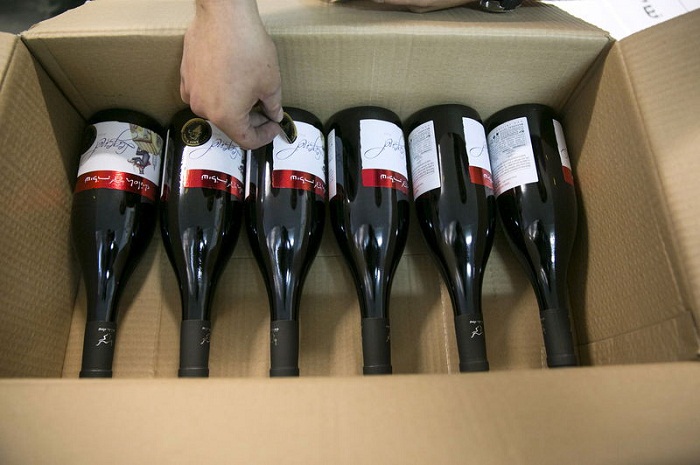Drawn up over three years by the European Commission, the guidelines mean Israeli producers must explicitly label farm goods and other products that come from settlements built on land occupied by Israel if they are sold in the European Union.
The decision comes at a time of high tension between Israel and Palestinians. Twelve Israelis have been killed in attacks by Palestinians and more than 70 Palestinians, 44 of them assailants according to police, have been killed by security forces at scenes of attacks and many others in violent protests in the West Bank and near the Gaza border
The violence is in part fuelled by the occupation and the growth of settlements.
Israeli officials, briefed that the decision was coming, were quick to denounce it. The foreign ministry said it was a political move designed to pressure Israel over its settlements policy. It summoned the EU ambassador to Israel and said it would suspend diplomatic dialogue in the coming weeks.
Prime Minister Benjamin Netanyahu, who was in Washington on an official visit, called the decision “hypocritical and a double standard”, saying the EU was not taking similar steps in hundreds of territorial conflicts elsewhere in the world.
“The European Union should be ashamed of itself,” he said. “We do not accept the fact that Europe is labelling the side being attacked by terrorist acts.”
Netanyahu’s office also said he and U.S. Secretary of State John Kerry had discussed how to curb violence, improve living conditions in the West Bank and advance the diplomatic process.
It said Frank Lowenstein, the acting U.S. special envoy for Israeli-Palestinian negotiations, would visit Israel next week to discuss those three issues. The last U.S.-brokered Israeli-Palestinian peace talks collapsed in 2014.
The EU’s position is that the lands Israel has occupied since the 1967 Middle East war – including the West Bank, East Jerusalem and the Golan Heights – are not part of the internationally recognised borders of Israel.
As such, goods from there cannot be labelled “Made in Israel” and should be labelled as coming from settlements, which the EU considers illegal under international law.
The development of settlements has been one of the obstacles to negotiations between Israel and the Palestinians.
“It’s an indication of origin, not a warning label,” the EU ambassador to Israel, Lars Faaborg-Andersen, told Reuters.
While there is no EU official wording, goods must carry the word “settlement” on the tag when sold in European shops. If an Israeli farmer refuses, a retail outlet can attach the label themselves, as the European Commission has sufficient information about where goods come from.
Senior Israeli diplomat Dore Gold, the director general of Israel’s Ministry of Foreign Affairs, said the EU move held Israel to a different standard than other countries and would threaten Palestinian jobs.
“Many in Israel do feel that there could be anti-Semitic motivations,” he told Reuters Television in Washington. “I don’t believe so, but certainly it leaves Israel feeling very uncomfortable with their European partners.”
Israel’s foreign ministry said in a statement the EU decision could harm long-standing peace efforts by strengthening “radical elements advocating a boycott against Israel and denying Israel’s right to exist.”
DOUBLE STANDARD CHARGE
Two elements have particularly enraged Israeli officials. They see the measures as an effective boycott of Israel – akin to the Palestinian-led Boycott, Divestment and Sanctions movement that has gained traction in recent years – and say other cases of long-standing occupation, such as Morocco’s seizure of Western Sahara, are not treated in the same way.
The EU dismisses the suggestion of a boycott, pointing out that it is not telling consumers what not to buy. Those who do not want to buy Israeli settlement goods probably already avoid them, and those that support the settlements may now more actively seek out settlement produce.
The question of a double-standard is harder for the EU, which has been criticised over Western Sahara in the past. When it comes to goods from northern Cyprus, seized by Turkey in 1974, the EU calls it “an internal issue.”
The details of the guidelines, set out in a five-page document, were published online, making clear that they involve no changes to existing laws but are merely clarifications.
Israel’s Economy Ministry estimates the impact of Wednesday’s decision will be about $50 million (£33 million) a year, affecting fresh produce such as grapes and dates, wine, poultry, honey, olive oil and cosmetics made from Dead Sea minerals.
That is around a fifth of the $200-$300 million worth of goods produced in settlements each year, but a drop in the ocean next to the $30 billion of goods and services traded between Israel and the European Union each year.
Israeli farmers and wine growers in the West Bank said they were worried about the impact on their business. Some have begun diversifying into markets in Russia and Asia to escape EU rules.
More about:
















































